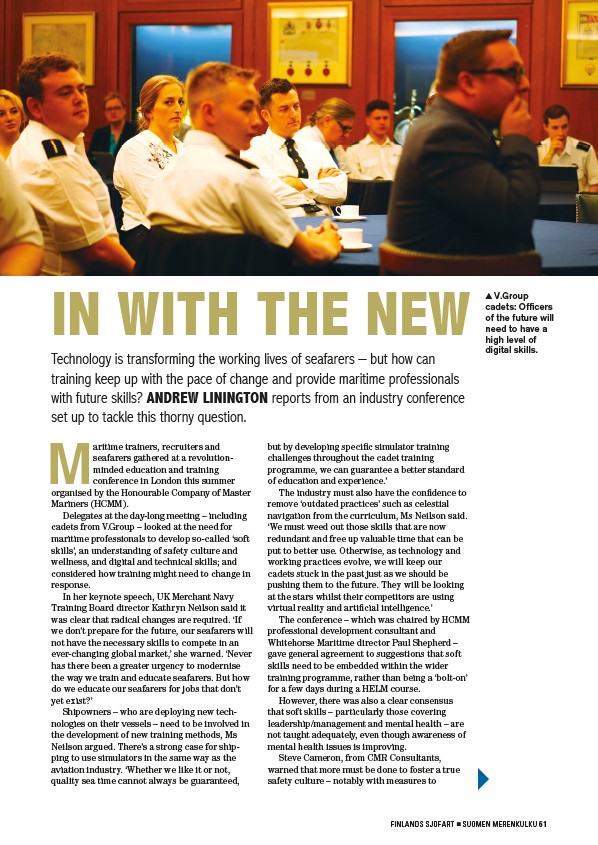
A
FINLANDS SJÖFART J SUOMEN MERENKULKU 61
Maritime trainers, recruiters and
seafarers gathered at a revolution-minded
education and training
conference in London this summer
organised by the Honourable Company of Master
Mariners (HCMM).
Delegates at the day-long meeting – including
cadets from V.Group – looked at the need for
maritime professionals to develop so-called ‘soft
skills’, an understanding of safety culture and
wellness, and digital and technical skills; and
considered how training might need to change in
response.
In her keynote speech, UK Merchant Navy
Training Board director Kathryn Neilson said it
was clear that radical changes are required. ‘If
we don’t prepare for the future, our seafarers will
not have the necessary skills to compete in an
ever-changing global market,’ she warned. ‘Never
has there been a greater urgency to modernise
the way we train and educate seafarers. But how
do we educate our seafarers for jobs that don’t
yet exist?’
Shipowners – who are deploying new tech-nologies
on their vessels – need to be involved in
the development of new training methods, Ms
Neilson argued. There’s a strong case for ship-ping
to use simulators in the same way as the
aviation industry. ‘Whether we like it or not,
quality sea time cannot always be guaranteed,
but by developing specific simulator training
challenges throughout the cadet training
programme, we can guarantee a better standard
of education and experience.’
The industry must also have the confidence to
remove ‘outdated practices’ such as celestial
navigation from the curriculum, Ms Neilson said.
‘We must weed out those skills that are now
redundant and free up valuable time that can be
put to better use. Otherwise, as technology and
working practices evolve, we will keep our
cadets stuck in the past just as we should be
pushing them to the future. They will be looking
at the stars whilst their competitors are using
virtual reality and artificial intelligence.’
The conference – which was chaired by HCMM
professional development consultant and
Whitehorse Maritime director Paul Shepherd –
gave general agreement to suggestions that soft
skills need to be embedded within the wider
training programme, rather than being a ‘bolt-on’
for a few days during a HELM course.
However, there was also a clear consensus
that soft skills – particularly those covering
leadership/management and mental health – are
not taught adequately, even though awareness of
mental health issues is improving.
Steve Cameron, from CMR Consultants,
warned that more must be done to foster a true
safety culture – notably with measures to
G V.Group
cadets: Officers
of the future will
need to have a
high level of
digital skills.
IN WITH THE NEW
Technology is transforming the working lives of seafarers – but how can
training keep up with the pace of change and provide maritime professionals
with future skills? ANDREW LININGTON reports from an industry conference
set up to tackle this thorny question.